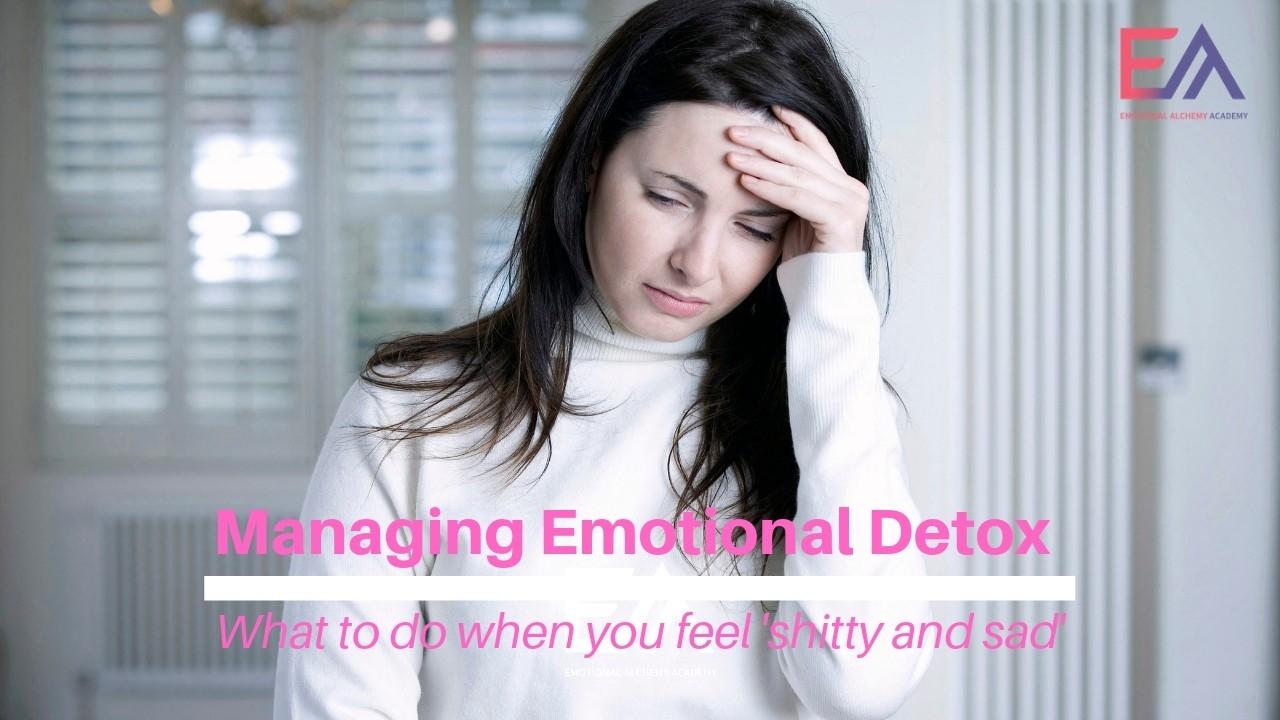Emotional Detox: what to do when you feel shitty and sad!

Understanding and navigating the 'Emotional Detox' effect
Not everyone knows about the 'emotional' detox effect which often occurs during either a physical detox or an emotional healing response. Understanding and knowing how to navigate the 'Emotional Detox' effect can help you move through it quicker and easier.
Physical Detox
Most (although not all) people have heard of the 'physical detox effect':
A short period of time when the body goes through a physical detox or withdrawal experience shortly after commencing a physical detoxification program or particular treatment therapy.
Symptoms of detoxification (when toxins are self-clearing from the cells) or withdrawal (when addictive toxins such as tobacco, drugs, caffeine or alcohol are self-clearing from the cells) are varied and can include headaches, nausea, sickness, vomiting, diarrhea, digestive issues and more.
Bearing in mind the digestive system is the organ of elimination, it is not surprising that detox effects occur in this system. In fact, the body is doing its job just perfectly!
Depending on the severity of the original toxification, detox symptoms can last anywhere from a few hours to a few weeks, or even months in severe drug addiction. Whilst it is usually pretty unpleasant to go through the detox process, it is a positive process as far as the body is concerned, because it's getting rid of what has been damaging it. So we can be extremely grateful for our body's incredible intelligence to self-detoxify!
'Emotional Detox'
Anger
Fewer people know about the 'emotional' detox effect which can occur either during a physical detox or an emotional healing response.
For example, often during a physical detox, as the liver is being cleaned out (the liver being one of the major organs of detoxification, as well as the organ charged with storing toxins in the first place), we can feel really shitty! We are feeling this way because our body is getting rid of all the s*** it no longer needs!
Symptoms of shittyness include grumpiness, anger, impatience, intolerance, short-temperedness and any type of emotion along the 'anger' spectrum. We can also feel 'low' as in slightly depressed, because de-pression is the unconscious 'suppression' of anger, and unconsciously we may be suppressing the 'shittyness' which is trying to come out.
So where does this anger come from?
Understanding the connection between the internal organs and emotions gives us the answer:
In Chinese medicine different emotions 'gravitate' to and are related with different organs. The emotions relating to the liver are anger and frustration. If we have stored anger inside us, (unconsciously stored throughout our life), once we start to clear the liver physically, it will also start to self-clear emotionally.
Again, as with the physical detoxification process, we should be grateful for this clearing, although emotionally it is usually not a pleasant experience.
Sadness
Another common emotion experienced during the detox process is sadness and grief.
Sadness and grief are related to the lungs and large intestine, which are both organs of elimination.
Sadness and grief are also naturally stored as emotions in the lungs and large intestine.
Therefore it is no surprise that as we detoxify either emotionally (through emotional clearing work, grief counselling, therapy etc) or physically, we may start releasing these emotions.
We may find ourselves crying for no reason.
We may find ourselves remembering old, upsetting events from the past which we thought we had dealt with, and yet here they are again, dammit! Normally when this happens it's because the 'shadow' of the event we thought we had cleared is now clearing, because events can have multiple layers. We are complex beings!
How to navigate an emotional detox
There are several things we can do to make our way through these emotional clearing periods as quickly and easily as possible. Here are a few suggestions and steps you can take:
1. RECOGNITION
The first step is to recognize you are experiencing an emotional detox (also commonly known as a 'healing response'). Often we don't recognize it at first, especially if this phenomenon is new to you. Instead you will be caught up in the drama / emotions of the anger or sadness, and if you don't know how to self-clear your emotions*, you can experience quite a few unpleasant days.
Once you recognize that the detox effect is a positive phenomenon (even though it doesn't feel 'positive' while it is happening at all), you can approach it in a constructive way.
2. ACCEPTANCE
The second essential step is acceptance of what is. We can't change what we don't recognize and accept. Accept this is happening and stop resisting it, because 'what we resist persists'.
3. GENTLENESS
Now is the time to be gentle and kind with yourself. If we are feeling grumpy, angry or sad, and old emotions from the past are clearing out, this means on some level the body is re-living the original trauma or event, and it needs and wants your loving, caring, compassionate attention. In addition, if we are going through a physical detox, the body is already working hard to clear toxins from the system, which means we really need to honour all the hard work it is doing to make your life better.
Now is the time to be super gentle and caring. Now is the time to relax, take a warm bath, have a cup of tea, watch a chick flick. The body-mind absolutely needs caring attention.
4. MANAGE / CLEAR THE EMOTIONS
The more techniques we have under our belt for self-managing and clearing emotions, the quicker we are going to get through the emotional detox. If you have done the EA levels 1 and 2 training programs, you will have a perfect set of techniques for doing so. Or maybe you already have your own techniques already. Just do whatever works!
5. CENTERING AND CALMING EXERCISES
As I teach in the EAA, one of the most important things to do whenever we 'lose our centre' and become inwardly disturbed, is to do something to bring ourselves back to a place of calm and harmony.
Whilst this may be the last thing we feel like doing when we are grumpy or sad, (because believe it or not, emotions themselves become an addiction), if we can bring ourselves back to our centre, we will feel so much better.
Examples of calming and centering exercises include abdominal breathing, qigong, yoga and meditation. Or even just going for a nice walk can do wonders (especially as it helps toxins to move from the liver).
So there is much we can do to navigate our way through both the physical and emotional detox effects. The key is to:
- understand the phenomenon
- recognize when it has kicked in
- be kind to oneself
- and take constructive action to make our way through and back to balance
Happy detoxing!
*see the Emotional Alchemy Level 1 and Level 2 trainings on how to self-clear emotions
Stay connected with news and updates!
Join the EAA enews list to receive the latest updates with details of free trainings and online programs.
Don't worry, your information will never be shared and you can unsubscribe at any time.


